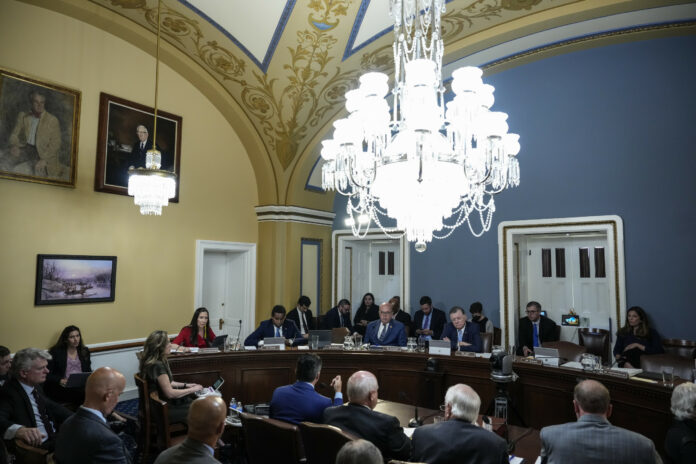Four Democrats and two Republicans on the House Rules Committee voted against the deal backed by Democratic President Joe Biden and Republican House Speaker Kevin McCarthy during a key House decision.
Despite the opposition, on a vote of 7-6, the bill advanced to the House floor, where the full House of Representatives will debate the measure on Wednesday.
The 99-page Fiscal Responsibility Act needs a majority to pass the Republican-led House and the Democratic-controlled Senate. The bipartisan deal to raise the federal debt ceiling needs to be approved before the June 5 deadline to avert default on the nation’s $31.5 trillion debt. Congress has just days left to act on the bill before defaulting, which experts say would have dire impacts on the national and global economies.
Drew Angerer/Getty
Biden and McCarthy reached a final deal on Sunday, which they both referred to as a “compromise.” The measure faces the hurdle of drumming up enough support to win approval in both chambers. Some Republicans and Democrats have expressed contempt for the bill, which would raise the debt limit for two years while also capping federal spending. However, Republicans wanted more significant spending cuts while Democrats wanted the debt limit to be raised without preconditions as it has in the past.
A spokesperson for the House Rules Committee told Newsweek that those who voted against the bill were not immediately available for comment.
Two Republicans, Representatives Ralph Norman of South Carolina and Chip Roy of Texas, and all four of the committee’s Democrats, voted against the measure.
Roy has been vocal in his opposition. During a press conference with the conservative House Freedom Caucus, he said that no member of his party should support the bill.
“If you’re out there watching this, every one of my colleagues, I’m going to be very clear, not one Republican should vote for this deal,” Roy said. “It is a bad deal.”
Norman described the Biden-McCarthy plan as “smoke and mirrors.” The South Carolina Republican said that his party’s negotiators “should have walked away” from the table after the House passed the GOP’s “Limit, Save, Grow Act” and forced Democrats to either agree or accept default.
Democratic Representative Jim McGovern of Massachusetts, who also voted against the measure, criticized the bill’s paperwork requirements for those who get federal assistance benefits, arguing that it would “make poor people poorer.”
“Everybody here wants to avoid a catastrophic default on our debt,” McGovern said, adding that he hopes that Congress could do it “without increasing hunger.”
“We don’t hold the Defense Department accountable for cost overruns,” he said. “Yet we are doubling down on poor people.”
The committee’s other three Democrats, Representatives Mary Gay Scanlon of Pennsylvania, Joe Neguse of Colorado and Teresa Leger Fernández of New Mexico, also voted against the bill.
Scanlon slammed the negotiation process, referring to it as “hostage-taking.” She called the looming default a “manufactured crisis,” while arguing that the bill takes food away from hungry seniors and families.
“It is supremely irresponsible to threaten a global economic meltdown to appease a radical minority,” she said in a clip that she shared on her Twitter account. “That’s not legislating. It’s hostage-taking.”
It is supremely irresponsible to threaten a global economic meltdown to appease a radical minority. That’s not legislating. It’s hostage-taking. pic.twitter.com/fhZomnN3Si
— Congresswoman Mary Gay Scanlon (@RepMGS) May 31, 2023
Neguse has also been vocal about his opposition, blaming Republicans for creating a “fake” potential economic crisis in a Twitter post last week.
“Republicans have manufactured a crisis, forcing the country to choose between cruel cuts imposed by their Default on America Act or a devastating default,” he said.
House Republicans have manufactured a crisis, forcing the country to choose between cruel cuts imposed by their Default on America Act or a devastating default.
It is a false — and dangerous — choice.
Proud to join @WhipKClark & Chair @RepPeteAguilar in opposing their efforts. pic.twitter.com/n7sBJBN6XJ
— Rep. Joe Neguse (@RepJoeNeguse) May 23, 2023
Fernández echoed her Democratic colleagues and blamed Republicans for hurtling the country toward the brink of economic devastation.
“We were forced to the precipice of financial ruin because Republicans refused to raise the debt limit,” she said on Twitter. “Our veterans, seniors, Medicare recipients, and so many others were worried their benefits would be slashed.”
We were forced to the precipice of financial ruin because Republicans refused to raise the debt limit.
Our veterans, seniors, Medicare recipients, and so many others were worried their benefits would be slashed.
The message got out. I’m glad we rejected a default on America. pic.twitter.com/uC5Wo7sucM
— Rep. Teresa Leger Fernández (@RepTeresaLF) May 30, 2023
Representative Tom Cole, chairman of the rules committee, said he understands that the Republican majority and Democratic minority will be “dissatisfied” with the bill but seems confident it will garner enough support.
“Some of my friends in the minority may not like cutting back spending, and some of my friends in the majority may feel this doesn’t go far enough,” the Oklahoma Republican said. “And there are certainly members like me who would like to spend more on defense than is provided in this bill.”
Cole, who is serving his 10th term, said that while “divided government” is expected, Americans also expect both sides of the aisle to work together for the “good of the nation.”
“And when we take this bill to the floor, that is exactly what we will achieve,” the veteran lawmaker said.


